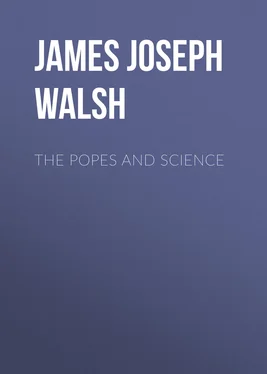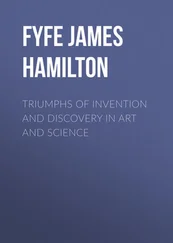James Walsh - The Popes and Science
Здесь есть возможность читать онлайн «James Walsh - The Popes and Science» — ознакомительный отрывок электронной книги совершенно бесплатно, а после прочтения отрывка купить полную версию. В некоторых случаях можно слушать аудио, скачать через торрент в формате fb2 и присутствует краткое содержание. Жанр: foreign_prose, foreign_religion, foreign_antique, на английском языке. Описание произведения, (предисловие) а так же отзывы посетителей доступны на портале библиотеки ЛибКат.
- Название:The Popes and Science
- Автор:
- Жанр:
- Год:неизвестен
- ISBN:нет данных
- Рейтинг книги:4 / 5. Голосов: 1
-
Избранное:Добавить в избранное
- Отзывы:
-
Ваша оценка:
- 80
- 1
- 2
- 3
- 4
- 5
The Popes and Science: краткое содержание, описание и аннотация
Предлагаем к чтению аннотацию, описание, краткое содержание или предисловие (зависит от того, что написал сам автор книги «The Popes and Science»). Если вы не нашли необходимую информацию о книге — напишите в комментариях, мы постараемся отыскать её.
The Popes and Science — читать онлайн ознакомительный отрывок
Ниже представлен текст книги, разбитый по страницам. Система сохранения места последней прочитанной страницы, позволяет с удобством читать онлайн бесплатно книгу «The Popes and Science», без необходимости каждый раз заново искать на чём Вы остановились. Поставьте закладку, и сможете в любой момент перейти на страницу, на которой закончили чтение.
Интервал:
Закладка:
The best way to show exactly what Pope John intended by his decree is to quote the decree. It does not occur in the ordinary collection of the bulls of John XXII., for it was not, as we have said, a bull in the canonical sense of the term, but a Papal document of minor importance. There is an important distinction between a decree and a bull, the former being but of lesser significance, usually referring only to passing matters of discipline. The decretal may be found in the Corpus Juris Canonica, Tome II., which was published at Lyons in 1779. It is among the decrees or constitutions known as Extravagantes. [Footnote 14]
[Footnote 14: The meaning of this term we discussed in the previous chapter on Anatomy in relation to the bull of Boniface and Liber VI. The motto of the publisher of the volume in which it occurs deserves quotation because of its apt application in the present circumstance. It is in Latin: "Quod tibi fieri non vis, alteri ne feceris"–"What you would not have done to yourself, don't do to another." If writers about the Popes were as careful to substantiate accusations against them as fully as they would like any accusations against themselves to be corroborated before being accepted and circulated, we should hear much less of Papal intolerance and of Church opposition to science. Even a dead Pope must be considered as a man whose reputation one should not malign without good reason and substantial proof. I must add that, as with regard to the other Papal documents mentioned, I owe the copy of this decree to Father Corbett, of St. Charles Borromeo Seminary, Overbrook, Pennsylvania, and am indebted to him besides for many helpful suggestions.]
We quote the decree as it is found in Canon Law:
The Crime of Falsification.
"Alchemies are here prohibited and those who practise them or procure their being done are punished. They must forfeit to the public treasury for the benefit of the poor as much genuine gold and silver as they have manufactured of the false or adulterate metal. If they have not sufficient means for this, the penalty may be changed to another at the discretion of the judge, and they shall be considered criminals. If they are clerics, they shall be deprived of any benefices that they hold and be declared incapable of holding others." (See also the Extravagant of the same John which begins with the word 'Providens' and is placed under the same title.) [Footnote 15]
[Footnote 15: The decree referred to here was issued by John XXII. against the counterfeiting of the money of France. The fact that the two decrees should be considered by canonists as connected in subject shows just what was thought to be the purport of the first, namely, to prevent the debasement of the currency by the admixture of adulterate gold as well as to protect the ignorant from imposition.]
"Poor themselves, the alchemists promise riches which are not forthcoming; wise also in their own conceit they fall into the ditch which they themselves have digged. For there is no doubt that the professors of this art of alchemy make fun of each other because, conscious of their own ignorance, they are surprised at those who say anything of this kind about themselves; when the truth sought does not come to them they fix on a day [for their experiment] and exhaust all their arts; then they dissimulate [their failure] so that finally, though there is no such thing in nature, they pretend to make genuine gold and silver by a sophistic transmutation; to such an extent does their damned and damnable temerity go that they stamp upon the base metal the characters of public money for believing eyes, and it is only in this way that they deceive the ignorant populace as to the alchemic fire of their furnace. Wishing to banish such practices for all time, we have determined by this formal edict that whoever shall make gold or silver of this kind or shall order it made, provided the attempt actually follows, or whoever shall knowingly assist those engaged (actually) in such a process, or whoever shall knowingly make use of such gold or silver either by selling it or giving it for debt, shall be compelled as a penalty to pay into the public treasury, to be used for the poor, as much by weight of genuine gold and silver as there may be of alchemic metal, provided it be proved lawfully that they have been guilty in any of the aforesaid ways; for those who persist in making alchemic gold, or, as has been said, in using it knowingly, let them be branded with the mark of perpetual infamy. But if the means of the delinquents are not sufficient for the payment of the amount stated, then the good judgment of the justice may commute this penalty into some other (as, for example, imprisonment, or another punishment, according to the nature of the case, the difference of individuals, and other circumstances.) Those, however, who in their regrettable folly go so far as not only to sell moneys thus made but even despise the precepts of the natural law, pass the bounds of their art and violate the laws by deliberately coining or casting or having others coin or cast counterfeit money from alchemic gold or silver, we proclaim as coming under this animadversion, and their goods shall be confiscate, and they shall be considered as criminals. And if the delinquents are clerics, besides the aforesaid penalties they shall be deprived of any benefices they shall hold and shall be declared incapable of holding any further benefices." [Footnote 16]
[Footnote 16: The Latin text of this decretal will be found entire in the appendix.]
It is evident that John's decree against "The Crime of Falsification" did not directly forbid chemistry, nor alchemy in the proper sense of the word, nor did it in any way interfere with the study of substances to determine their composition, or the synthesis of materials to produce others, provided there was no pretense of making gold and silver in order to obtain genuine gold and silver from ignorant dupes. There seems to be no doubt that had the famous scheme to obtain gold from sea water, which caused serious loss to so many foolish and even poor people a few years ago, come up during the time of John XXII., he would have prevented it from being so lucrative to its promoters, by publicly denouncing them and promulgating a law for their punishment.
It may be considered that excommunication was not a very severe penalty for such dishonest practices, and that the sharpers who gave themselves to such a profession, which would be about that of the confidence or green goods men of our time, were not likely to be affected much by this merely religious deprivation. It must not be forgotten, however, that in those ages of faith, excommunication became an extremely telling social punishment. It was forbidden that anyone, even nearest and dearest friends, should have anything to do with the one excommunicated until the ban was removed. It was bad enough in a town where everyone belonged to the same church, and all went to church frequently, to be forbidden to go there; it was infinitely worse, however, to have everybody who passed refuse to greet you or have relations of any kind with you. President Hadley, of Yale, said, not long since, that social ostracism is the only effective punishment for such manifest extra legal irregularities, which are yet not so essentially criminal as to bring those guilty of them under legal punishment. The sentence of excommunication was an effective social ostracism–the completest possible. This is an aspect of excommunications usually missed, but well deserving of study by those who resent the use of such an instrument by ecclesiastical authorities. Just as soon as the man repented of what he had done and promised to do so no more, he was received back into the Church, and the ostracism ceased, so long as he did not relapse into his forbidden ways.
When the eminently beneficial character of this Papal document is thus appreciated, it is indeed painful to have to realize, that for its issuance John has been held up more to scorn and ridicule than perhaps has ever been the case for any other single formal document that has ever been issued by an ecclesiastical or political authority. He was simply correcting an abuse in his day, the existence of which we recognize and would like to be able to correct in ours. For this eminently proper exercise of the Papal power, however, his whole character has been called into question, and a distinguished modern educator has used every effort to place him in the pillory of history, as one of the men who have done most to hamper progress in science and education in all world history. The amusing thing is the utter inequality between the document itself and its supposed effects. Of course it had no such effect as President White claims for it, and, indeed, he seems never to have seen the document in its entirety before it was called forcibly to his attention long after his declarations with regard to it were published. The real attitude of Pope John XXII. with regard to education and the sciences, which was exactly the reverse of that predicated of him by his modern colleague in education, will be the subject of the next chapter.
Читать дальшеИнтервал:
Закладка:
Похожие книги на «The Popes and Science»
Представляем Вашему вниманию похожие книги на «The Popes and Science» списком для выбора. Мы отобрали схожую по названию и смыслу литературу в надежде предоставить читателям больше вариантов отыскать новые, интересные, ещё непрочитанные произведения.
Обсуждение, отзывы о книге «The Popes and Science» и просто собственные мнения читателей. Оставьте ваши комментарии, напишите, что Вы думаете о произведении, его смысле или главных героях. Укажите что конкретно понравилось, а что нет, и почему Вы так считаете.












